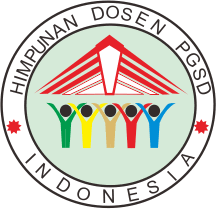Hubungan antara minat belajar dengan kemampuan berpikir kritis matematis peserta didik kelas V Sekolah Dasar
Abstract
The study to determine whether or not there is a relationship between interest in learning and mathematical critical thinking ability. This study used a quantitative approach with a correlational method. The population in this study is all grade V students of SD Negeri in Laweyan District for the 2022/2023 school year. The sampling technique in this study uses the Cluster Random Sampling technique. Data collection techniques use questionnaires to collect data on learning interest and use tests to collect data on mathematical critical thinking abilities. The data analysis technique in this study is the Product Moment correlation analysis technique from Karl Pearson. Based on the results of data analysis, a correlation coefficient value of 0.517 was obtained with a significance of 0.00. The value of the coefficient is positively marked and the value of significance is 0.00 < 0.05. This means that there is a positive and significant relationship between interest in learning and the ability to think critically mathematically. The conclusion in this study is that there is a positive and significant relationship between interest in learning and mathematical critical thinking, increasing interest in learning is also accompanied by increasing mathematical critical thinking ability.
Keywords
Full Text:
PDFReferences
[1] H. Prastyo, “Kemampuan Matematika Siswa Indonesia Berdasarkan TIMSS,” J. Padegogik, vol. 3, no. 2, pp. 111–117, 2020, doi: 10.35974/jpd.v3i2.2367.
[2] S. Hadi and Novaliyosi, “Trends in International Mathematics and Science Study (TIMSS),” in Prosiding Seminar Nasional & Call For Papers, 2019. doi: 10.1007/978-94-6209-497-0_97.
[3] S. Riyadhotul, H. Suyitno, and I. Rosyida, “Pentingnya Literasi Matematika dan Berpikir Kritis Matematis dalam Menghadapi Abad ke-21,” vol. 2, pp. 905–910, 2019.
[4] E. Y. Wiyaja, D. A. Sudjimat, and A. Nyoto, “Transformasi Pendidikan Abad 21 Sebagai Tuntutan,” J. Pendidik., vol. 1, pp. 263–278, 2016, [Online]. Available: http://repository.unikama.ac.id/840/32/263-278 Transformasi Pendidikan Abad 21 Sebagai Tuntutan Pengembangan Sumber Daya Manusia di Era Global .pdf. diakses pada; hari/tgl; sabtu, 3 November 2018. jam; 00:26, wib.
[5] P. A. Facione, Critical Thinking: What It Is and Why It Counts, vol. XXVIII, no. 1. 2020.
[6] J. Yanti, N. Istiqomah, and E. Indarini, “Meta Analisis Efektivitas Model Problem Based Learning dan Problem Posing Terhadap Kemampuan Berpikir Kritis Siswa Sekolah Dasar Pada Pembelajaran Matematika,” J. Cendekia J. Pendidik. Mat., vol. 05, no. 01, pp. 670–681, 2021.
[7] Suparman, D. Juandi, and M. Tamur, “Problem-Based Learning for Mathematical Critical Thinking Skills : A Meta-Analysis,” J. Hunan Univ. (Natural Sci., vol. 48, no. 2, pp. 133–144, 2021.
[8] Y. L. Djawa et al., “Kemampuan Berpikir Kritis Siswa dalam Menyelesaikan Soal Himpunan,” Prima Magistra J. Ilm. Pendidik., vol. 3, no. 35, pp. 116–122, 2022.
[9] S. W. Prameswari, S. Suharno, and S. Sarwanto, “Inculcate Critical Thinking Skills in Primary Schools,” Soc. Humanit. Educ. Stud. Conf. Ser., vol. 1, no. 1, pp. 742–750, 2018, doi: 10.20961/shes.v1i1.23648.
[10] Slameto, Belajar dan Faktor-faktor yang Mempengaruhinya. Jakarta: Rineka Cipta, 2013.
[11] Pitadjeng, Pembelajaran Matematika yang Menyenangkan. Yogyakarta: Graha Ilmu, 2015.
[12] A. Ibrahim, A. H. Alang, Madi, Baharuddin, M. A. Ahmad, and Darmawati, Metodologi Penelitian. Jakarta: Gunadarma Ilmu, 2018. [Online]. Available: http://repositori.uin-alauddin.ac.id/12366/1/BUKU METODOLOGI.pdf
[13] S. Arikunto, Prosedur Penelitian: Suatu Pendekatan Praktik. Jakarta: Rineka Cipta, 2010.
[14] C. Wulandari, “Pengaruh Profitabilitas terhadap Nilai Perusahaan dengan Corporate Social Responsibility sebagai Variabel Moderasi,” J. Ilmu dan Ris. Akunt., vol. 11, no. 2, pp. 128–135, 2022, doi: 10.55182/jnp.v1i2.36.
[15] J. Jusmawati, S. Satriawati, and I. R, “Pengaruh Motivasi Berafiliasi Terhadap Keaktifan Belajar Matematika Siswa Sd Inpres Perumnas Antang Kota Makassar,” JRPD (Jurnal Ris. Pendidik. Dasar), vol. 1, no. 2, pp. 158–165, 2018, doi: 10.26618/jrpd.v1i2.1571.
[16] Sugiyono, Metode Penelitian Kuantitatif Kualitatif Dan R&D. Bandung: Penerbit Alfabeta, 2020.
[17] A. P. Wulandari, T. Rustini, and Y. Wahyuningsih, “Penggunaan Media Pembelajaran terhadap Keterampilan Berpikir Kritis IPS Siswa Sekolah Dasar,” J. Educ., vol. 05, no. 02, pp. 2848–2856, 2023.
[18] H. U. Ummi and I. Mulyaningsih, “Penerapan Teori Konstruktivistik Pada Pembelajaran Bahasa Arab di IAIN Syekh Nurjati Cirebon,” Indones. Lang. Educ. Lit., vol. 1, no. 2, p. 42, 2016.
[19] E. B. Hurlock, Perkembangan Anak, Edisi 6. Jakarta: Erlangga, 2006.
[20] A. Krapp, The construct of interest: Characteristics of individual interests and interest related actions from the perspective of a person object theory. Inst. für Erziehungswiss. Und Pädag. Psychologie, Univ. der Bundeswehr, 1993.
[21] O. J. Dores, D. C. Wibowo, and S. Susanti, “Analisis kemampuan berpikir kritis siswa pada mata pelajaran matematika 1,” J. Pendidik. Mat., vol. 2, pp. 242–254, 2020.
[22] G. Kencanawaty, “Pengaruh metode pembelajaran kooperatif dan minat belajar terhadap kemampuan berpikir kritis matematika siswa,” Res. Dev. J. Educ., vol. 2, no. 2, 2016.
[23] O. P. D. Sari, N. A. Wulandari, W. K. Umah, and Mustangin, “Analisis kemampuan berpikir kritis dalam menyelesaikan masalah kontekstual berdasarkan minat belajar matematik,” AKSIOMA J. Mat. dan Pendidik. Mat., vol. 12, no. 2, p. 103, 2021, doi: 10.26740/jrpipm.v4n2.p103-116.
[24] F. N. Fikri, M. Mardiyana, and Y. Kuswardi, “Analisis kemampuan berpikir kritis dalam pemecahan masalah matematika berdasarkan langkah-langkah facione pada materi program linear ditinjau dari minat belajar siswakelas xi man purwodadi tahun ajaran 2016/2017,” J. Pendidik. Mat. dan Mat. SOLUSI, vol. 1, no. 2, pp. 20–36, 2017.
Refbacks
- There are currently no refbacks.



